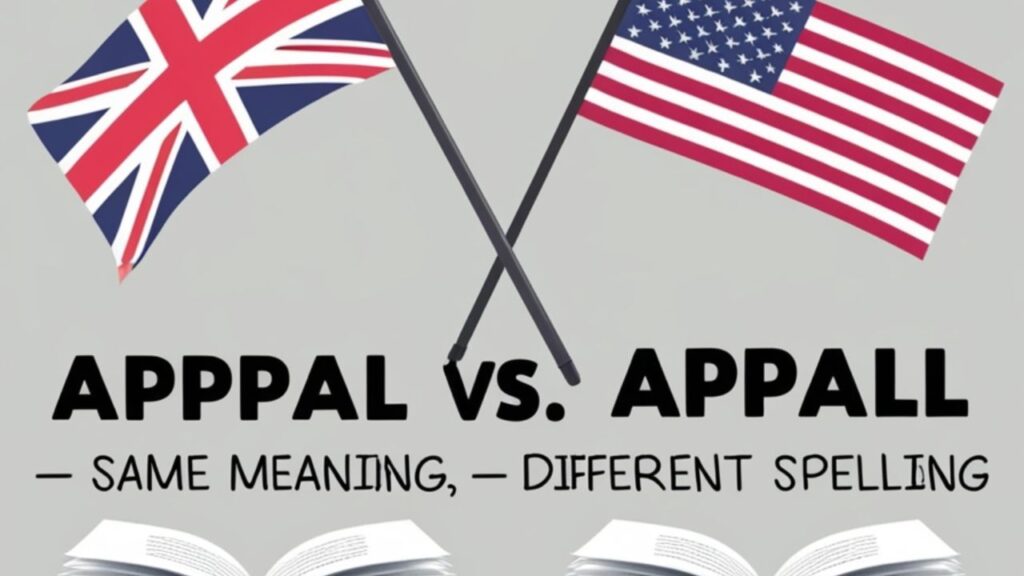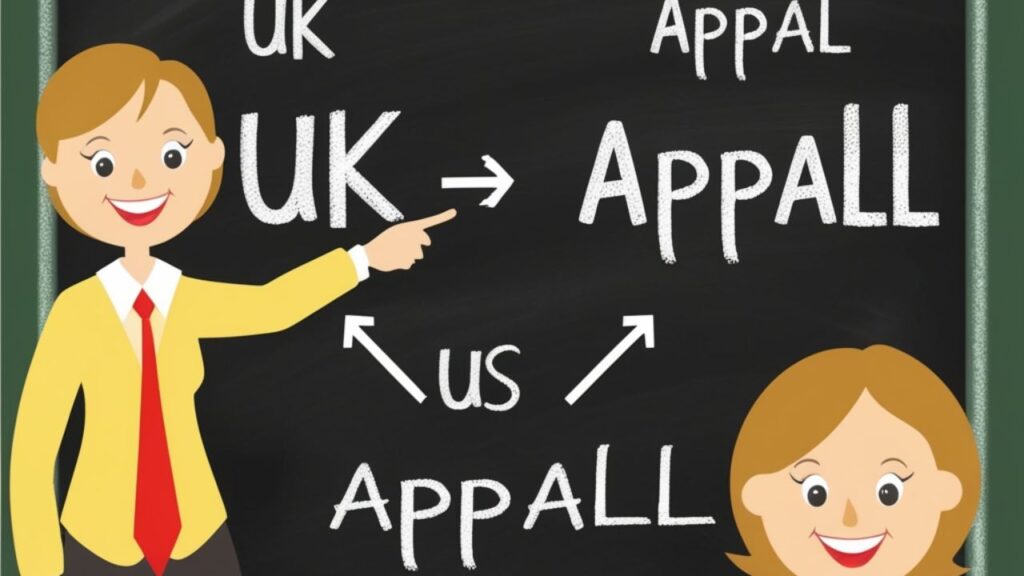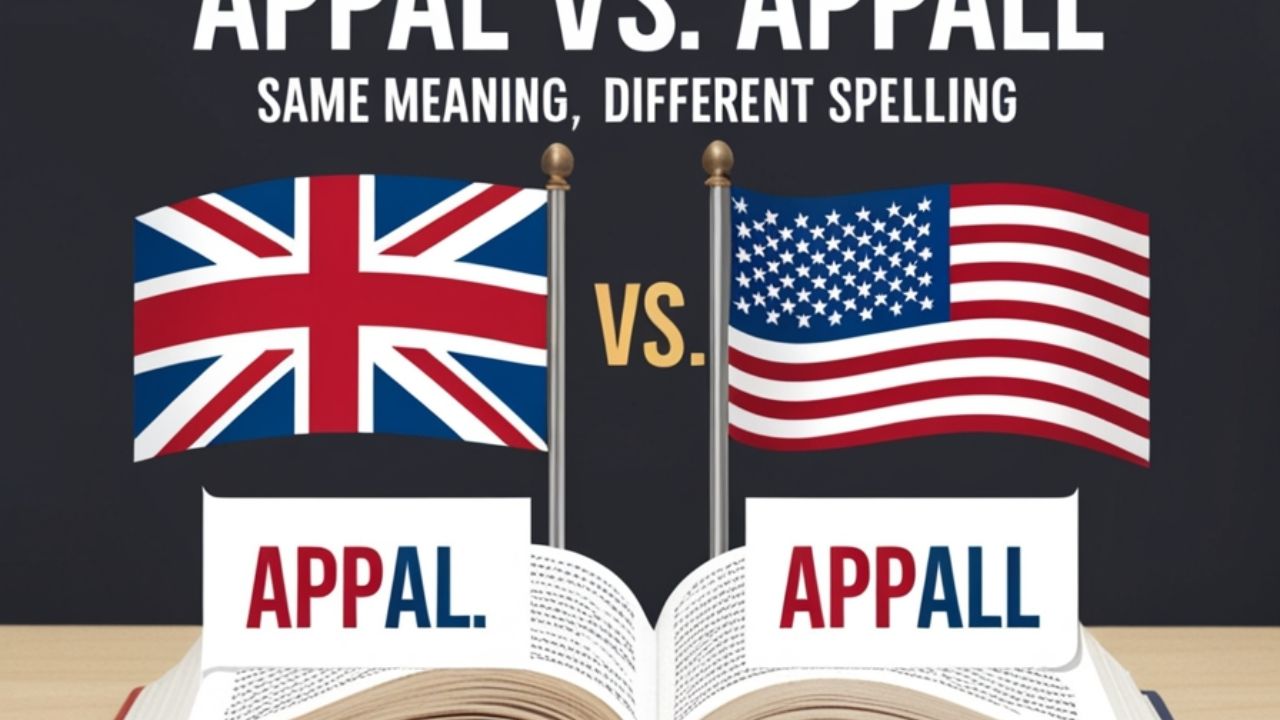Appal and Appall mean the same thing. Both words show a feeling of great shock or horror. The only change is in spelling. People in Britain write appal, and people in America write appall when they want to say the same idea.
Writers use these words to talk about things that are very bad or upsetting. You can say, “The news will appall many people,” or “The story will appal readers.” Both spellings tell us that something is very shocking or unpleasant.
Always choose the spelling that fits your reader. If you write for British readers, use appal. If you write for Americans, use appall. Both forms are correct in meaning and help make your writing clear and respectful.
The Key Difference Between “Appal” and “Appall”
Appal and Appall have the same meaning, but people spell them differently in different places. In British English, writers use appal, while in American English, they use appall. Both words talk about feeling strong shock, fear, or sadness.
When you write, pick the spelling that matches where your readers live. Using appal in the United Kingdom and appall in the United States helps your writing look neat and correct. It also shows that you understand English from both sides of the world.
| Word | Meaning | Spelling Region | Example Usage |
| Appal | To shock or horrify | British English | “The violence will appal many viewers.” |
| Appall | To shock or horrify | American English | “The decision appalled the entire community.” |
Understanding the Meaning of “Appal” and “Appall”
- Both words mean to shock, upset, or horrify someone deeply.
- They describe strong emotional reactions to bad or unpleasant events.
- The only difference between them is spelling, not meaning.
Example:
“I was appalled by the conditions in the hospital.” (Here, the speaker is expressing intense emotional distress, not mild disappointment.)
The Origins and Etymology of “Appal” and “Appall”

The word Appal comes from old languages used many years ago. It first appeared in Middle English and was taken from the Old French word “apalir,” which meant “to turn pale.” People used it to describe someone turning white with fear.
Later, the spelling changed in both British and American English. The idea stayed the same—showing strong feelings of shock or horror. Over time, it stopped meaning “to grow pale” and started to mean “to feel deeply upset or frightened.”
Evolution of the Word:
The word Appal has changed slowly through time. It began from the Latin word “pallere,” which meant “to become pale.” Later, it moved into Old French and then into English, keeping its link to fear and surprise.
As years passed, the word’s meaning grew stronger. It stopped being about turning pale and became about deep shock or horror. Writers started using it to show powerful feelings when something bad or frightening happened.
| Stage | Language | Word Used | Meaning |
| Classical Latin | pallere | – | To be pale |
| Old French | apalir | – | To grow pale with fear |
| Middle English | appallen | – | To cause someone to grow pale (from shock) |
Quick Reference Table
| Country/Region | Preferred Spelling | Notes |
| United Kingdom | Appal | “Appall” is acceptable in rare cases |
| United States | Appall | “Appal” is considered incorrect |
| Canada | Appall | Follows U.S. spelling |
| Australia | Appal | Some U.S. influence |
| New Zealand | Appal | Slight U.S. influence |
Real-World Usage: What the Data Says
Looking at spelling preferences in actual use gives us an even clearer picture.
Google Ngram Viewer: Appal vs. Appall (1800–2019)
- The single-L form ( appal ) remains the clear favourite in British English texts throughout the centuries, showing steady usage. (Grammar Whisper)
- The double-L form ( appall ) grew rapidly in American English from the early 1800s and now dominates in U.S. publications. (Grammar Whisper)
- Although global communication has increased both spellings remain regionally anchored — the British one strong in the UK/Commonwealth, the American one strong in North America. (grammarpaths.com)
COCA (Corpus of Contemporary American English)
- The spelling appall appears thousands of times in American-English sources, while appal shows up only a handful of times—indicating the double-L form dominates U.S. usage. (Grammar Whisper)
- In the COCA-based frequency lists (such as via wordfrequency.info), appall ranks significantly higher among common verbs. (wordfrequency.info)
- The inflected forms like appalled and appalling are used broadly across American English writings and function with the same spelling regardless of region. (GRAMMARIST)
How to Use “Appal” and “Appall” in Sentences
British English Examples
- “The rude comment will appal many people who read it.”
- “Poor living conditions in the old building truly appal the residents.”
- “The teacher felt deeply appalled by the careless behavior of the students.”
American English Examples
- “The unfair decision completely appalled the audience at the meeting.”
- “It was an appalling mistake that shocked everyone in the company.”
- “The news report appalled many viewers across the country.”
Verb Forms and Inflections
Regardless of spelling, both forms follow regular verb conjugation patterns.
Verb Conjugation Table
| Tense | British English (Appal) | American English (Appall) |
| Base Form | appal | appall |
| Present Simple | appals | appalls |
| Past Simple | appalled | appalled |
| Present Participle | appalling | appalling |
| Past Participle | appalled | appalled |
“Appalling” as an Adjective
Whether you use “appal” or “appall,” the adjective “appalling” remains unchanged.
It means very bad, horrific, or shocking in a negative way.
Example Uses:
- “The hospital’s dirty rooms were truly appalling to visitors.”
- “His rude words appalled everyone sitting at the table.”
- “The waste of food in the kitchen was an appalling sight.”
Synonyms for “Appalling”:
- Terrible – something very bad or unpleasant.
- Horrifying – causing strong fear or shock.
- Dreadful – extremely unpleasant or upsetting.
“Appalled” in Past Tense
The word Appalled shows a strong feeling of fear or shock that happened before now. It tells that someone saw or heard something terrible and felt very upset. People use it to describe a moment that truly disturbed them.
Writers often use Appalled to share emotions in stories or news. It helps readers understand how bad or serious an event felt. For example, “She felt appalled by the loud shouting” shows clear surprise and sadness at what happened.
See also Is It Correct to Say “Thanks for the Add”? Explained
Real-World Examples from News:
- “Parents felt deeply appalled by the poor school safety rules.” – The Guardian
- “Citizens were appalled by rising prices and unfair taxes.” – New York Times
- “Many viewers felt appalled after seeing the shocking report.” – BBC News
Historical Usage Trends and Case Studies
Historical Linguistic Shifts
- In early English writing, both appal and appall appeared together without clear regional rules.
- Over time, British English chose the one-L spelling, while American English kept the double-L form.
- Global media spread both styles, but each region still prefers its traditional version today.
Literary Case Studies
Writers from both Britain and America used Appal and Appall in famous books. British authors like Charles Dickens showed how poor people lived and felt appalled by their pain. Their words helped readers see the sadness and fear in real life.
American writers such as Ernest Hemingway used the same feeling in stories about war and loss. When he wrote about violence, he felt deeply appalled by what people could do. These examples show how one word can express strong human emotions in different lands.
Common Mistakes to Avoid

Using the wrong spelling in the wrong region can undermine your writing’s professionalism.
Mistakes to Watch For:
- Mixing appal and appall in the same piece of writing causes confusion.
- Writing appaling instead of the correct appalling is a common spelling error.
- Using the American spelling appall in formal British writing looks incorrect.
See also Dead to Rights Meaning: Origin, Usage & Examples
Writing Tips: Which Version Should You Use?
The choice depends entirely on your audience.
Use Appal if you are writing for:
- British publishers that follow UK spelling and grammar rules.
- Schools or universities in England, Australia, or New Zealand.
- Magazines or newspapers written mainly for a British audience.
Use Appall if you are writing for:
- American publications that follow U.S. English spelling standards.
- Canadian readers or writers who use American-style English.
- Academic papers or books written under APA or Chicago style guides.
Quick Quiz: Test Yourself
This short Quick Quiz helps learners check their understanding of spelling and meaning. It gives simple sentences with blanks to fill in using Appal or Appall. Each answer shows which spelling fits British or American English use.
The Quick Quiz makes learning fun and clear. It teaches correct usage through short examples, helping students remember regional spellings. By reading and writing both forms, learners build stronger English skills and gain confidence in choosing the right word.
Summary Table: Everything at a Glance
| Feature | British English | American English |
| Base Verb | appal | appall |
| Adjective | appalling | appalling |
| Past Tense | appalled | appalled |
| Used in | UK, AUS, NZ | US, Canada |
| Accepted Alternative | appall (rare) | appal (not accepted) |
| Common Usage Context | Journalism, Ac |
Final Thoughts
In the Final Thoughts, both spellings mean the same feeling of fear or shock. The only change lies in the way people from different places write it. Each form shows care for language and respect for local writing style.
Writers should always stay careful about which spelling fits their readers. Knowing when to use Appal or Appall shows good learning and skill. Clear and correct spelling helps every piece of writing look smart and professional.
FAQs
How do you spell Appal in England?
In British English, it’s spelled “appal,” while in American English, it’s “appall.”
What is the meaning of Appall?
It means to shock, horrify, or greatly dismay someone.
What is the meaning of Appal in a sentence?
Example: “The news will appal everyone,” meaning it will deeply shock or upset them.
How do I say I’m appalled?
You can say, “I’m appalled,” meaning you’re shocked or disgusted by something unpleasant.

Join Bibcia on a journey to master English grammar. Discover easy lessons, writing tips, and practical examples designed to make learning grammar simple and effective.










